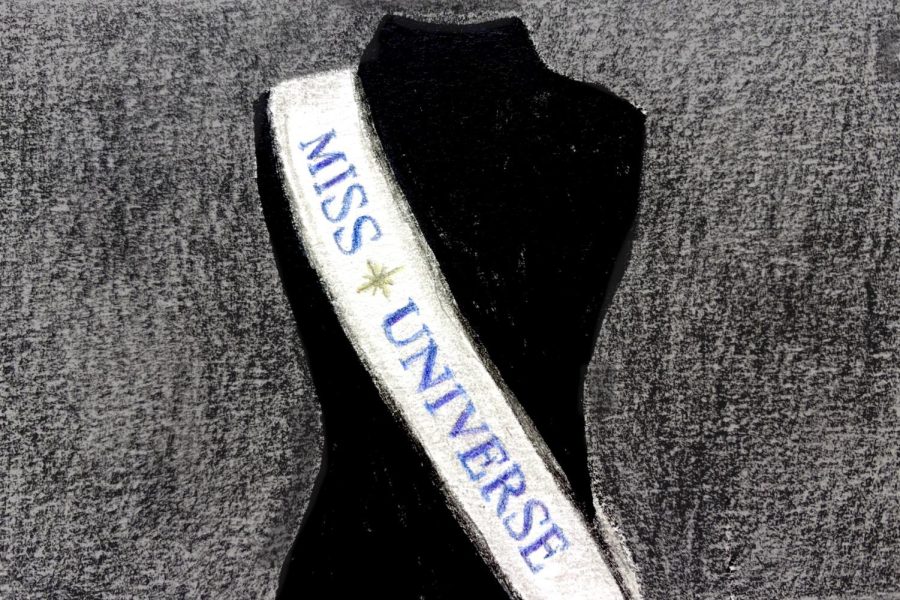Opinion: Miss Universe falls short in many categories
Credit: Alyssa Ao
WSPN’s Delia Caulfield discusses the controversy surrounding the Miss Universe organization.
March 18, 2023
Since 1952, the Miss Universe pageant has shone a spotlight on women from across the world who embody the values of the Miss Universe organization. The pageant’s owners describe their goal as showcasing female empowerment and unity internationally, with a leading lady that would take over responsibilities, to solve some of the most pressing issues our world is facing today. However, after the lights dim, cameras turn off and gowns are hung up, the organization seems to hibernate until the stage curtains open the following year.
Although many past winners have gone on to support important initiatives, the competition seems to overshadow the philanthropic work that is the sole purpose of winning the title. It’s not the organization’s fault that the glitz and the glamor of the pageant itself almost always overshadow the beneficial work of the winner that follows the pageant. But, why is this the case in the first place?
The Miss Universe brand takes over a woman’s identity and life. We need to be reminded that this is not a monarchy, this is a pageant. While a woman is crowned queen at the end of the pageant, the weight of the crown is not equivalent to recognition for the work that comes afterwards. To me, it seems more materialistic than philanthropic.
For an alleged display of “female unity,” this pageant has fallen short in so many categories. First off, up until this year, the Miss Universe pageant upheld unrealistic standards for contestants, leaving a small window for a certain type of woman to compete. Women who were engaged, married, had children or were over the age of 28 years old were not allowed to compete, creating the notion that the “ideal” Miss Universe was a young, single woman.
Even the contestants are aware of the blasphemy of some of the rules. When asked what is one thing she wished she could change about the Miss Universe pageant, 2023 pageant winner R’Bonney Gabriel said that she hopes the age to compete is raised to over 28 years old, therefore, closing the mere 10-year window in which women are eligible to compete.
For a while, I felt on the fence about the pageant world, acknowledging that it was not one I wanted to participate in, however, I didn’t have too much of a problem with it. My only insight into the 2023 Miss Universe pageant itself was the clips on YouTube of contestants answering questions, sometimes with intelligence and grace, but the pageant answers that seemed to garner the most clicks on YouTube were the more bizarre ones.
Despite all the wrongs this organization has represented throughout the years, some immense milestones were reached this year. 2023 marks the year of a new Miss Universe organization under the leadership of Anne Jakrajutatip, who is a Thai business woman. This is the first time that a non-American and transgender woman has owned the Miss Universe organization.
The significance of Jakrajutatip’s leadership is monumental for the pageant because it contrasts the previous owners of the organization that didn’t align with the message that the Miss Universe organization had been trying to portray. Former President Donald Trump co-owned the Miss Universe pageant for almost 20 years, but was forced to sell it in 2015 following his comments regarding Mexican immigrants.
This year, in particular, had a specific controversy, as the United States winner R’Bonney Gabriel’s win was called unjust by many. Even during her run at Miss America, some of her fellow contestants believed that her win was planned from the start, exposing even deeper inequity in the pageant world.
In addition, many have expressed that the pageant favors English speakers to win. Although translators are provided for the contestants who don’t speak English, it is true that they are at a disadvantage in comparison to their English-speaking competitors.
Along with Gabriel, the final three this year consisted of Andreína Martínez from the Dominican Republic and Amanda Dudamel from Venezuela, with Dudamel using a translator and Martínez answering in English. So, with English only being the winner’s first language, viewers were left with even more questions regarding the impact of language in determining the winner of the pageant.
While I understand the concerns of Gabriel’s win, I still struggle to grasp the message that is being conveyed as a result of this controversy and how it affects the image of the pageant world as a whole.
What right do we have to determine which woman is more deserving than another? What do we get out of it, truly? Yes, the stakes are higher in some countries than others, with a Miss Universe win being almost equivalent to the title of a sports championship. However, the hate towards an individual who will go on to support crucial initiatives is not acceptable in the slightest, no matter what country’s name they wear on their sash.
I wonder how a 21st century competition that is supposed to manifest change and uplift women seems to be doing the exact opposite. Despite the progress in ownership and the relaxing of some of the formerly baffling pageant rules, it seems like the pageant is stuck in the 1900s.
I’m not exactly sure what, if any, will be done in order to change the narrative surrounding the pageant world, but 70 years later, we need to start asking ourselves if we want these archaic expectations of women to continue on years into the future. Instead of dimming the spirit of millions of women, we should be shining a light on those standing up for change, and hopefully soon, we will have a Miss Universe organization that represents that.





![Last Wednesday, the Wayland School Committee gathered to discuss a number of topics regarding the health curriculum and Innovation Career Pathway course. Another large topic of conversation was the ways to potentially mitigate distracting cell phone usage. "These [phones] are going to distract your learning and social relationships," Superintendent David Fleishman said. "That's concrete right there."](https://waylandstudentpress.com/wp-content/uploads/2025/06/Screenshot-2025-06-04-at-9.49.31 PM-1200x886.png)



























![Troy Hoyt finishes the Boston Marathon, running for the Hoyt Foundation. T. Hoyt is the son of Hoyt Foundation CEO Russ Hoyt.
“[Running a marathon] might seem like a big thing, when it’s presented to you at first, but if you break it up and just keep telling yourself, “Yes, you can,” you can start chipping away at it. And before you know it, you’ll be running the whole 26 miles, and you won’t even think twice about it.” T. Hoyt said.](https://waylandstudentpress.com/wp-content/uploads/2025/04/C36E8761-1CBB-452E-9DF2-543EF7B1095E_1_105_c.jpeg)














































